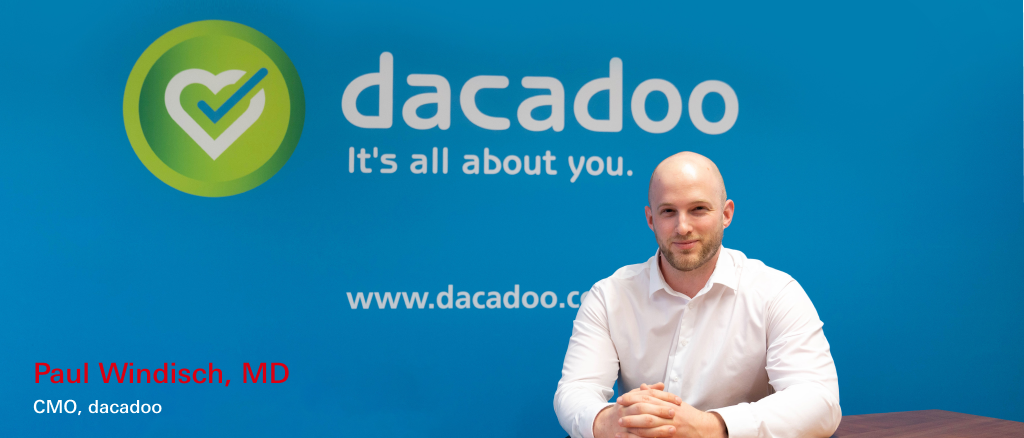Health apps – changing the way people manage their health
Health incentive programmes and wellness apps are fast becoming many people’s preferred way to manage their wellbeing. How do they work? What are the benefits of using them? We talked to an international expert on interactive health management platforms to get his insights.
Essentially, a health incentive programme is anything that in some way incentivizes users to adopt a lifestyle that is conducive to their health and maximises their chances of living healthy. The most common incentives are monetary rewards, gifts of products and vouchers. You can also reward users in a more abstract way, for example, by using gamification features. Whatever the incentives you offer, it should be about empowering people to understand and take control of their own health.
The health score is mainly good for getting an estimate of where you stand, as compared to your peers, for instance. It’s like the latest status update on your health. That in itself is already a benefit, because it’s not always easy to say how good your health is. You can try to estimate it based on what you believe is healthy. You can then decide if you want to make this or that change to get an even better score or if you’re already satisfied.
The difficult thing is finding the right balance -- keeping people motivated, but not so much that they feel exhausted from the experience. For example, people shouldn’t have to work out when they are sick, and they shouldn’t feel really guilty or depressed because they missed one workout. So the goals should be challenging and the experience should make users want to exercise, but we don’t want to wear them out. Finding that balance is key because you have people at different fitness levels. Many focus on helping unfit people to a more fit state, but you can’t neglect the people who are already fit either. That often involves difficult design decisions. Designing a solution that accommodates both can be challenging.
I think the main factor is the availability of information. Information doesn’t necessarily support people in reaching better conclusions because some may just get overwhelmed and it can get even harder for them to make decisions. Another thing that definitely drove the demand is COVID, the regulations people have to cope with. Suddenly people didn’t even commute to work anymore which for some was their only physical activity. So they were looking for something that would help them take control of their own health. Here in Switzerland, mental issues increased, people became more sedentary and gained weight because a lot of them were cut off from their daily routines that involved some kind of activity.
The biggest game-changer for the industry so far, in my opinion, has been the wearables, such as smartwatches. They are now very easy to set up, use, and are capable of tracking a lot of things. More adoption of wearables and trackers makes it easier for Health and Wellness apps. And the use of these devices seems to be expanding through different age groups. Five years ago, this was mostly limited to fairly young, tech-savvy people, but as those technologies become more established, we will likely see the elderly using tracking devices more often. Maybe they set them up themselves, maybe their family members set them up for them, but it seems to be expanding through different age groups.
Data privacy is also becoming more and more important. Fifteen years ago, people were more uncritical about how their data were handled, but having seen a number of data breaches with social networks and websites, they are becoming more concerned, especially with something as sensitive as personal health. So having security certifications, setting up servers and storing data in the country where the user lives, are not a bonus anymore, these are now expected requirements.
Notes:
The information above is provided by the interviewee and reproduced here for reference only. It does not constitute any legal advice or recommendations for any individual. No financial decision should be made solely on the basis on such information. The opinions expressed above are the interviewee’s own, and not those of HSBC Life (International) Limited or the HSBC Group.
Talk with us
Want to know more how our products can help you? Get personalised support from our Insurance Specialists. Book a face-to-face appointment or meet with us over video.
Disclaimer
The thoughts and opinions expressed above are the interviewee’s own, and are reproduced here for reference only. They do not constitute any recommendation to any person. We shall not be liable for any potential health issues or loss that may be caused by or relating to any of the above information. All information and recommendations provided are for reference only. You should not make any decision based solely on such information. The opinions expressed are the interviewee’s own and not those of HSBC Life (International) Limited or the HSBC Group.
The information shown in this article is for reference only. HSBC life does not guarantee the accuracy of the contents and data derived from a third party, and you should not make any decisions based on this article alone. If you are in doubt about any of the contents in this article, you should seek independent professional advice. We do not undertake any obligation to issue any further publications to you or update the contents of this article, and such contents are subject to change at any time without notice. All contents are provided as general information only and does not constitute advice or recommendation. In no event will HSBC Life (International) Limited or HSBC Group be liable for any damages, losses or liabilities, including but not limited to direct or indirect, special, incidental, consequential damages, losses or liabilities, in connection with your or any third party’s use of this article or your reliance on or use of or inability to use the information contained in this article.
This article should not be reproduced or further distributed to any person or entities, whether in whole or in part, for any purpose.
HSBC Life has based this article on information obtained from sources it believes to be reliable, but which it has not independently verified. HSBC Life and HSBC makes no guarantees, representations or warranties and accepts no responsibility or liability as to its accuracy or completeness. Information in this article is subject to change without notice.
All information in the article is update up to May 2022
Issued by HSBC Life (International) Limited (Incorporated in Bermuda with limited liability)
© Copyright. HSBC Life (International) Limited. All rights reserved.
Date






